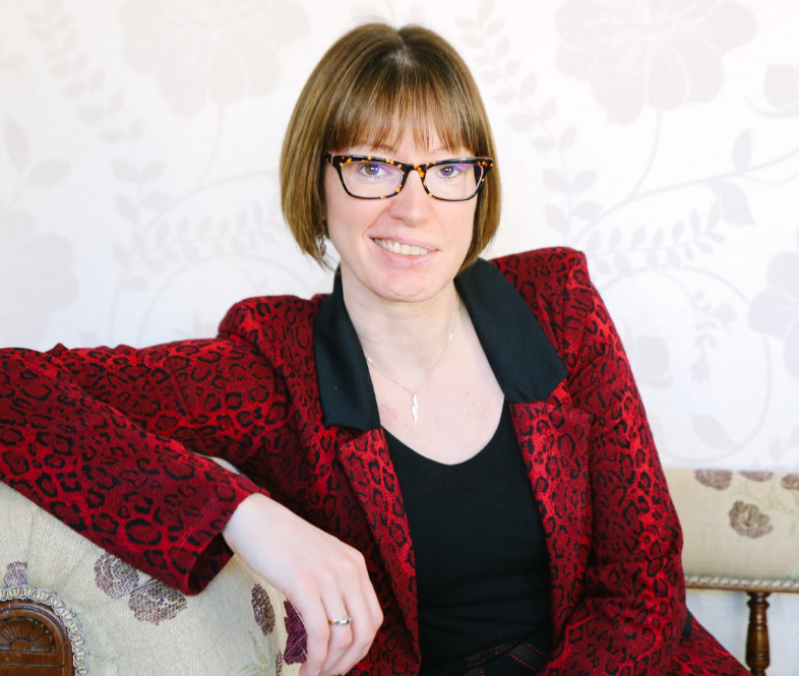
An advocate for the d/Deaf community challenges churches to reevaluate their approaches to fellowship and evangelism to better serve the distinctive needs of this sizeable people group, which has its own cultures and languages.
Emily Owen “knows what it is to be broken and what it is to meet God there.” Owen was diagnosed with a neurological condition called NF2-Schwannomatosis (NF2) as a teenager and suffered many medical surgeries to combat the health issue. NF2 led to brain surgery causing her to lose hearing traumatically overnight in Nov. 2001 at the age of 21. She also has to walk using crutches because of her condition.
However, Owen pushed on with her career in writing and public speaking on faith and disability topics. She writes her own blog and has authored several books, including devotionals and children's books, winning the Association of Christian Writers Award for Outstanding Contribution to Christian Publishing in 2018.
Owen also serves as a team member and email compiler for Open Ears, a UK charitable organization facilitating fellowship for impaired hearing Christians. Her mother Anthea is chair of the charity.
Speaking to Christian Daily International in a personal capacity, Owen explained how people with hearing issues broadly fall within three categories.
Deaf (capital letter D) people are born Deaf and usually use sign language as a first language. “Deaf is their culture,” Owen explained.
Secondly are those termed “deaf” (lowercase letter d), namely “people who, like me, lose their hearing in later life, usually who have acquired spoken language.”
Thirdly, “Hard of Hearing” people whose hearing needs to be amplified with a hearing aid.
“It is easy for any of the above categories to feel isolated in church, as communication is difficult,” said Owen, while outlining methods for churches to better engage with this people group.
“Churches who have a lot of visual information are helpful, though often the Deaf community do not read well, as English is their second language after sign language.
“Good lighting is important, as many people with any degree of hearing loss will lipread to an extent.”
Speech-to-Text apps can be useful for those who are able to read, she said.
Owen also said a good Loop System helps those with hearing aids, adding that background noise can make listening very challenging for those wearing such devices.
The issue of churches engaging with hearing loss people is international, not just in the U.K. Owen has just returned from the 21st International Conference for Pastoral Care among Hard of Hearing in Oslo, Norway, at the end of August. The theme was “Participation is possible” and talked about inclusion, with 42 people from nine countries attending.
The Joshua Project (TJT) estimates the world Deaf population between 30 and 70 million. Although often labeled as a disability, TJT has said a more accurate perspective is to see these people as a distinct cultural group with their own languages and history.
Asked if she had a particular message for evangelical churches on how to better engage with the Deaf, deaf and hard of hearing communities, Owen responded that it was rare for the needs of these communities to be prioritized by churches.
“Learn from Jesus,” she said. “In the healing of the deaf man story, Jesus took the man aside before He 'opened his ears'. That was such a kind and compassionate thing to do – noise/people/crowds can be overwhelming. It is unlikely that you will get to know a D/deaf/HoH person very well in a crowd.”
She encouraged churchgoers to ask a D/deaf person themselves what their specific needs were in order to access church life.
“People are different and may prefer different things. You can't be expected to know, but you can ask.”
“Perhaps consider offering deaf awareness training to your congregation,” Owen added. “There are charities and professional bodies that would come and give this.”
In some circumstances, it may be appropriate to recommend a D/deaf person attends another church with better facilities to meet their needs. “Sometimes signposting to another church, which would be better equipped to meet needs, is the best welcome,” said Owen.
“Remember that hearing loss/lack of hearing is very isolating, particularly when surrounded by hearing people. It is hard to follow what is happening.
“Allow time and space in your service for D/deaf people to keep up. Have visual indicators where possible.”
The importance of providing every possible means for a D/deaf person to feel fully included cannot be overstated. Hearing loss “steals confidence” and the church has a role in rebuilding self-esteem, helping them to feel properly incorporated into the church community.
“Hard of Hearing people especially will often feel very embarrassed – even ashamed – about their hearing loss, and try to disguise it – meaning they often miss out – so be aware of that.”
A further challenge remains with sharing the gospel of Jesus Christ with D/deaf communities. Owen said communication was the main obstacle. However, nothing is impossible with God, she says. She recalled a Deaf man becoming a Christian at a faith event recently where there had been a sign language interpreter.
“There is currently a project going [BSL Bible] which aims to make the Bible available in British Sign Language,” said Owen, “but it takes time.”
Owen asked believers to pray for the gospel to be “presented and available in an accessible way that [hearing loss] people can understand.” She referenced Romans 10:14: “And how can they believe in the one of whom they have not heard? And how can they hear without someone preaching to them?”





